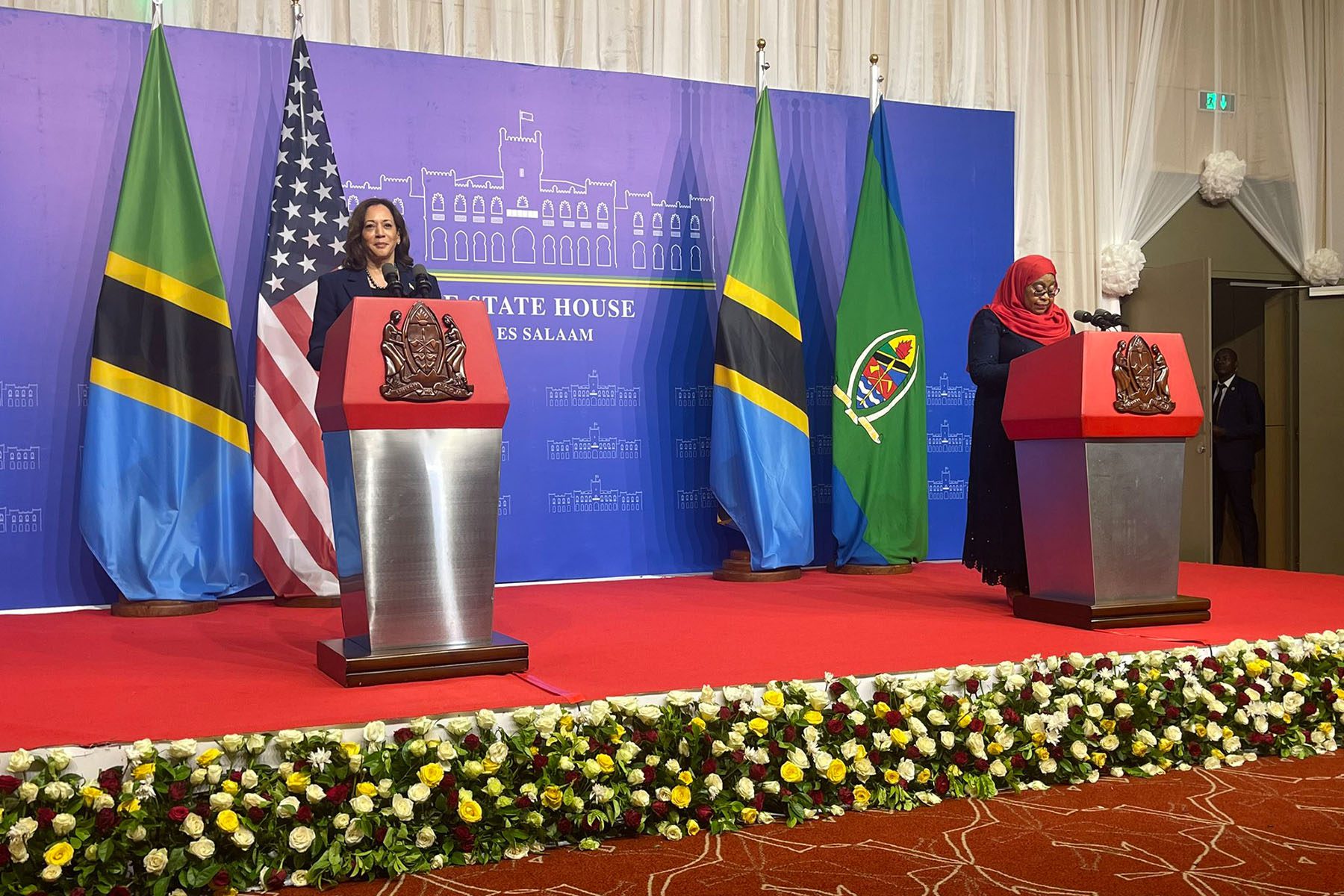Become a more informed member of our evolving electorate. Subscribe to The Amendment, a new biweekly newsletter by Errin Haines.
DAR ES SALAAM, Tanzania — The vice president of the United States and the president of Tanzania greeted each other Thursday for the first time on the African continent as the most powerful Black women in their respective countries.
Both Kamala Harris and Samia Suluhu Hassan are historic firsts, and Hassan is currently the only woman leader who is an official head of government in all of Africa’s 54 countries.
Harris was welcomed to the State House on Thursday afternoon, and the two shared a warm greeting before she signed a guest book. A large sign at the entrance declared “Karibu,” which means “welcome” in Swahili. The two women leaders then each issued press statements.
“Today, Tanzania has made another historic milestone with two female leaders, a vice president and a president, meeting here,” Hassan said. “The meeting takes place during this very important month, Women’s History Month. What an inspiration and a testimony to Tanzanian young girls.”
This is the third meeting between Harris and Hassan. They previously met at the White House in April 2021 and at the U.S.-Africa Leaders Summit in Washington in December. In the evening, Hassan will host Harris and Second Gentleman Doug Emhoff for a dinner, which will be attended by Tanzanian officials and private-sector representatives.
-
More from the Vice President’s trip to Africa:
-
More from the Vice President’s trip to Africa: Kamala Harris focuses on women’s economic inclusion and leadership on last day in Ghana
Women’s inclusion and, more importantly, leadership in politics as a cornerstone for democracy and prosperity have been themes of Harris’ week-long trip to the African continent, which she is visiting for the first time since becoming the first woman and African American to serve as the country’s second-most-powerful person.
Before Harris and Hassan met, Veronica Ndege Charles and Kemilembe Kamala, both 22, waited outside of the State House to participate in the welcome ceremony. They were among the dozens of women who had gathered Wednesday night to greet Harris at the airport in Dar es Salaam, wearing hats and T-shirts with a photo of Harris and a wrap skirt with a picture of Hassan.
Charles said it “means a lot” for her country to have its first woman president.
“She’s encouraging us to take every opportunity so we can raise our living standards. So she’s good for us,” Charles said.
Kamala was excited to meet the vice president. They share a name and a position — the university student is also vice president of her student government. A public administration major with her own political ambitions, Kamala said she hopes “something good” comes from Harris’ trip.
“I read on her Instagram account about her speaking to young people, about empowering entrepreneurs … it could be an opportunity for young females through partnership and investment.”
In Africa, nearly two dozen women have served as their country’s head of state. Hassan, who was formerly vice president, became Tanzania’s sixth president in 2019 after President John Magufuli died in office.
The United States has never elected a woman as commander-in-chief. Every American president except Barack Obama — 45 presidents in 233 years — has been a White man. Former first lady and Secretary of State Hillary Clinton made history in 2016 as the first woman presidential nominee of a major American political party but fell short of breaking the glass ceiling.
At home, Harris’ leadership has been criticized as uneven, and questions about her political value on the 2024 presidential ticket have been raised despite Biden’s endorsement of her as a true partner in the administration and Black women’s role as the backbone of Democratic politics. Biden has not announced his expected reelection campaign, but has said Harris will be his running mate should he decide to run again.
In Ghana this week, Harris projected strength, empathy and charm as she met with the country’s president, youth activists and creatives and women entrepreneurs.
At Cape Coast Castle on Thursday, she was a Black woman grappling with the legacy of slavery. Frequently on this trip, she revisited a role she played as prosecutor, as a champion for women to be free from violence.
The trip was an attempted shift in tone from the previous administration, and included announcements of $1 billion in public and private aid to support economic empowerment with a focus on gender equity.
On Friday, Harris is set to depart Tanzania for Zambia, the last country in her visit.







